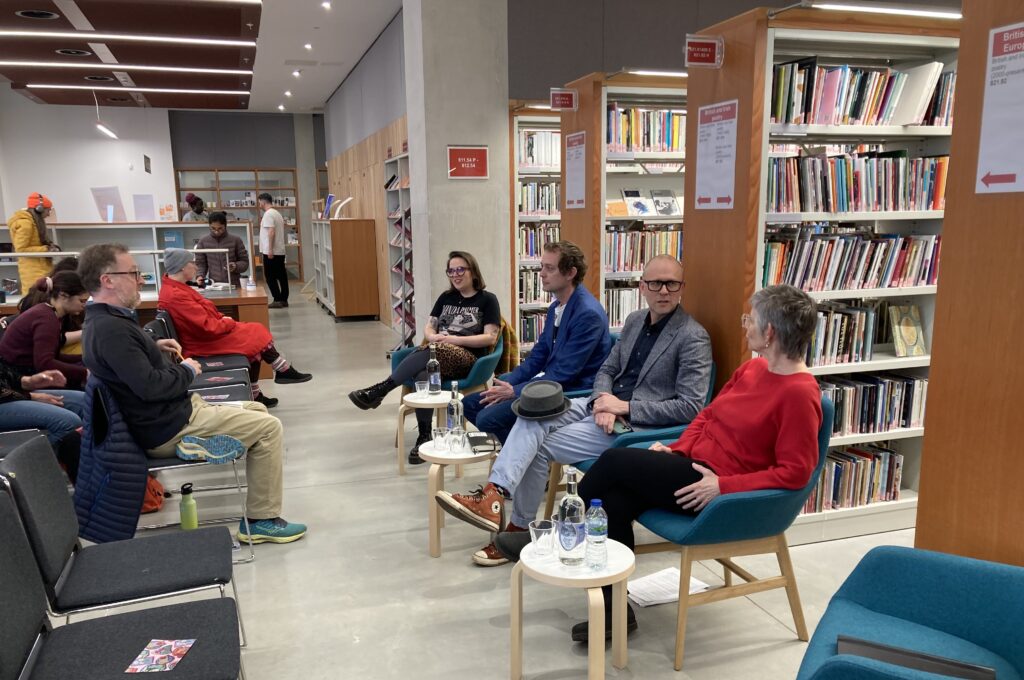Featured image: Manchester Poetry Library
As the weather changed from hail to sunshine for the fifth time that day, prevalent panellists met at the Manchester Poetry Library to discuss how the literary community is responding to the climate emergency. Although this weather is typical for Manchester, it feels slightly ominous when paired with this current climate conversation.
The Great Waking Up! event panelists included Monique Roffey, award-winning writer and lecturer in Creative Writing at Manchester Met’s Manchester Writing School and co-founder of Writers Rebel, joined by novelist James Miller, poet Chris Redmond, poet and podcaster Leena Norms, and poet and organiser of Poets for the Planet, Jacqueline Saphra.
Monique opened the event with a discussion on the recently introduced elective to Manchester Writing School’s curriculum, ‘Greenwriting’. ‘Greenwriting’ explores how creative writers can engage with ecological emergencies during a time of crisis, also teaching students how to bring traditionally non-fiction perspectives into the realm of fiction.
Roffey highlighted that in the past, writers used climate change as a plot point for sci-fi and dystopian novels. It was perceived as outlandish – something that would never actually happen. However, in 2019 the UK parliament declared a climate emergency. With this, people have been forced to accept that this is no longer fiction. Writers Rebel was born with the incentive to encourage creatives and writers alike to take action.
The multi-platform, writer-led activist group attached to Extinction Rebellion, enables writers to write and speak about climate change. The group are committed to “using the power of words to claim a safer, fairer future for all the planet’s inhabitants“.
Roffey was joined by panelist James Miller, novelist and another co-founder of Writers Rebel. Miller introduced himself by sharing that he published a ‘cli-fi’ (climate fiction) dystopian novel in 2010. When writing the novel, Miller struggled to conceptualise when this dystopian ‘future’ would be – at that time, there wasn’t as much talk about the climate crisis.
Millier explained the beginning of Writers Rebel; how he helped organise one of the first Extinction Rebellion protests in 2019, in Trafalgar Square. He reminisced that he ran the social media for Extinction Rebellion for two and a half years and “got out alive”.
Roffey shared her admiration for how these protests encouraged writers to leave their comfort zone, “Putting literature where literature didn’t exist before, in a rebellion space, onto the streets and in places where you don’t expect to hear poetry.”
The next panelist, Chris Redmond, poet and host of Tongue Fu poetry night and one-half of Hot Poets, contested the idea that writers are solitary people. His poetry nights encourage collaboration and focus on community.
Redmond hadn’t intended to focus his work on climate change until he saw the success of Writers Rebel, realising the enormous impact poetry can have on the world. He experienced this first hand when his business partner Liz Torc’s poem ‘The Human Emergency’ went viral and was used at protests.
Hot Poets was born when Redmond met Michal Nachmany, an author, researcher and advisor. Redmond praised the new elective ‘Greenwriting’ for contributing to creating cultural change through changing the writing narrative – a creative approach which the two have been working to integrate.
Hot Poets explores artists’ power while working with leading scientists, which Redmond described as mind-blowing. His role had previously been: “Protester and disrupter.” According to Redmond, the way to invoke real change is to start from the bottom up, from the grassroots.
The next speaker was panelist Leena Norms, a content creator and podcaster. Norms’s monthly podcast ‘No Books on a Dead Planet’ which discusses climate change, in particular books about climate change, has gathered around 50K listeners. She stated that she aims to be a funnel for climate content, someone who encourages her viewers to read books surrounding the climate crisis.
Norms shared that her climate change awakening came through reading, and the fact that there may be a time in the future where books don’t exist is terrifying to her.
The final panelist was Jacqueline Saphra, an award-winning poet and organiser of Poets for the Planet. Saphra began by comparing herself to the meme of the old lady holding a sign that says, “I can’t believe I’m still protesting this shit.”
While Saphra’s writing has always been politically motivated, she had never thought of using writing as a form of activism, until conducting her first ‘Poem-athon’ in 2016, which raised £30,000 for the refugee crisis. This idea developed into ‘Poets For The Planet’.
Saphra said, “The idea [is] that if there are enough of us, we can create change. But in a world where change seems so impossible, we have to have the imagination, and we have to have the will, and we have to have each other.”






Leave a reply